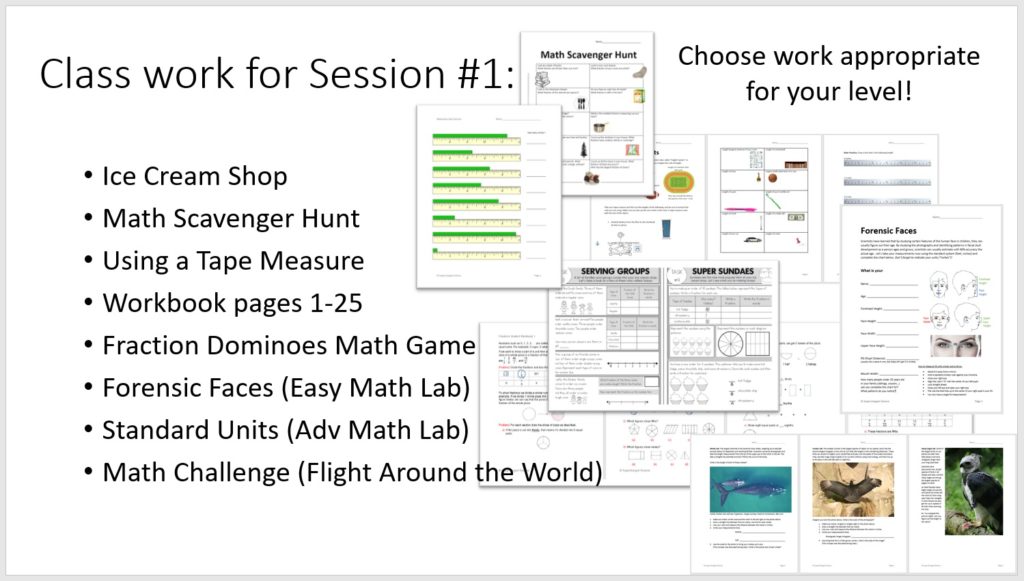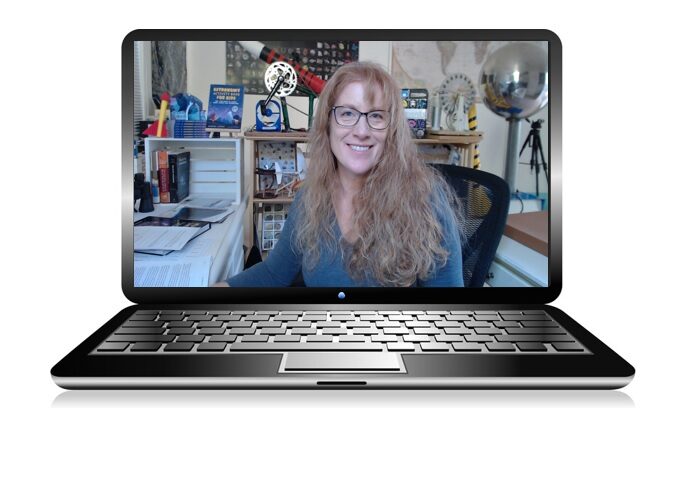Welcome to my Math Course!
I am so happy you are here!
As a teacher, staying on track can make the difference between overwhelmed with stress and feeling confidently successful.
My course is designed to take the hassle out of your day by having everything planned and executed so you can spend your time on the parts of teaching that matter most to you.
In this program, students are provided with clear, easy daily math lessons that not only teach the core skills and methods of mathematics, but it also forms a bridge between real life and how to use math every day.
Step 1: What level is your student currently at?
🗹 I have no idea.
Not a problem, we'll help you figure it out!
We need to know where your child is on the map before diving into any math course (not just ours).
Kids are ready for our entry level (Fractions) when they can add, subtract, multiply and divide by whole numbers and they have their multiplication table down.
Students are ready for our upper level (Algebra 1 & Middle School Geometry) when they can add, subtract, multiply and divide both fractions and decimals, and are also fluent in ratios, proportion, and percent.
Use the button above for our quick math assessment (please watch 3 minute video first).
🗹 I have some idea.
Do you have a rough idea about what your child has been studying, but you're not sure if there are gaps in their understanding?
No problem! First, decide on an area of math you'd like them to continue with:
- Fractions
- Decimals
- Percent
- Algebra 1
- Geometry (Grades 4-6th)
- Geometry (Grades 7-8th)
And download the WORKBOOKS for that level. Use the 2-page test at the back of each to place their level of mastery of that area of math.
Now go to Step 2 below.

🗹 I know exactly where they are in math.
Great! Your next job is to decide if you'd like to go through the program by Grade Level or by Topic.

For example, do you want to spend the year on just one topic or do you want to hop around to different areas appropriate for your child's level?
Also, start thinking about how much time you want to spend personally with your child in their math course. This includes everything from planning and developing every lesson to delivering the content, grading the homework and tracking their grades.
(Are you feeling overwhelmed yet? Don't worry - we're here to help with that, too.)
Go to Step 2 below!
Step 2: How much do you want to be involved?
🗹 I Want Total Control
Fantastic! We'll provide you with the entire curriculum, and you can put the elements together to custom-create your own program.
Download these three documents:
Your next step is to read over this content, and outline your educational goals for your child, setting up the milestones you want your child to reach for the entire year, each term, and every month.
Next, decide how many times every week and how long per session to devote to math studies. Most schools operate 170 days (34 weeks) every year, which can be a good starting point for your scheduling.
Now you figure out whether to go through this math program by Topic (Fractions, Decimals, Percent, Algebra, Geometry) or by Grade Level (Grades 4th - 8th).

Please note: a “beginner” simply means that the math concept being introduced is new to the student. “Intermediate" simply means students needs time practicing how to use the new concept, and "Advanced” means that the student is ready for the practical application of the concept.
Students may switch between “beginner”, "intermediate" and “advanced” at any time. These terms describe a student’s interest and ability, not grade or age.
🗹 I Want Some Control
but you do the hard stuff
Perfect! After you know your child's current level of math, your next step is to decide how you want to be involved.
Do you want to:
- ...help them study and learn?
- ...choose what they study this year?
- ...do the lessons with them?
Our program is very flexible and works with a variety of parent-teacher formats. You can work alongside your child, or set them up to go on their own with you peeking in from time to time.
Students work through the program using our daily lesson plans, and they can work synchronously (following our live class schedule) or asynchronously (go at your own pace and on your own schedule).
Use the appropriate Grade Level Guide below to see sample schedules:
We do the hard stuff! We prepare and deliver all math lessons, activities and homework, we answer all their questions... all you need to do is bring the kids!
Pick your child's Grade Level and start with the daily lessons. Your student will watch a math class with a teacher and then work on their assignment for the day. It's that easy!
We do ask that you help your child initially with the program, making sure they understand how it works and the expectations are. After that, you only need to check in weekly to see how they are progressing!
Students work through math lessons every day, and if they still have questions and need help, we recommend using the live Study Hall session with a teacher to get plenty of live teacher support (even if they work asynchronously - Study Hall is for all students no matter where they are in the program).
So jump into a Math Lesson and let's get started!
🗹 None - Do It For Me
Absolutely! Parents often use this approach if they're already overwhelmed with other areas of life. We're happy to help!

The first thing you need to do is decide which grade level your child is currently at (use the Quick Math Level Assessment).
Next, select the area of math and start with a teacher-led math lesson. After the lesson ends, there is a homework assignment your student will work on. Students work in an area of math (see buttons below) that starts with the workbook, then include activities, games, puzzles, challenges and finishes up with a study review and unit test.
Initially, your job (as the parent) is to see if your child connects with our classes. Ask them to focus on the teaching style, even if the math concept is new and not making sense yet. Let your child know that it's fine if they are not quite at this level yet, we want them to see what a class is like, and if they're interested in learning more from us.
Near the end of every class, we show students where to find assignments and activities, and in our live classes, we stay on to answer questions as students start their homework. This is your opportunity to ask about anything with the program!

We do ask that you help your child initially with the program, making sure they understand how it works and the expectations are. After that, you only need to check in weekly to see how they are progressing. So jump in get started!
Step 3: After the Math Class...
You decide how much math your student is ready for and what "consistent, steady progress" looks like for your student. Each student will have a different study schedule based on their interest, ability and how much they have mastered.
How do I know this is working for my child?
Each day, students watch a math lesson with a teacher (recorded or live). Students work on their daily homework assignments, which also include step-by-step instructional videos.
This program is designed for you to work through either synchronously or asynchronously so you may work with our live class schedule or go through the program at your own pace, on your own schedule. Students also have the opportunity for live help from a teacher in our private small-group Study Hall sessions.
Daily Review, Weekly Assessments and Unit Tests You will need a way to know how your student is doing on an ongoing basis. One of the regular math assignments we expect from students is tracking their own grades on paper (not on a computer). Students will be able to tell you which assignments they complete, what their current progress looks like, and if they need more or less time to finish their assignments.
In addition, each day students will be able to tell you how they are doing with the current lesson. This can be very simple, like you (the parent) choosing 1 or 2 questions randomly from the workbook pages they completed the day prior, or having them teach you a math concept they learned the day before. You don’t have to grade it… they are simply letting you know that they can move on to new material.
Focus on progress, not perfection.
We want to see consistent, daily progress with your student. The “right” amount of work is when they are happily engaged and eager for more. This amount will be different for every student.
Check In with your Student Set aside a time each day and/or week to connect with your child, even if it’s only 10 minutes, where they show you their current progress in their personal tracker. Also ask them:
- How did you do this week on your assignments?
- How do you feel about this?
- What can you do to make next day/week even better?
Take time to show your student you appreciate the work they are doing, and that their effort is important to you. Focus on what they did well, and ask about their specific plans for the upcoming week.

Do you have questions? We're happy to help! Check our FAQ.
Most students will be able to do their work independently after a little help from you, the parent, at the start.
Please make sure you work alongside your student when they start our program, as it can be overwhelming to start a new class and not really understand what the expectations are or what they are supposed to do.
Expect your student to spend time each day doing math work, at least 15 minutes per day working (for beginners) and 30-60 min 3-5 times per week for most students.
There will be workbook pages each day to learn new skills in addition to activities and math lab projects which vary each week.
We'll be providing students with workbooks each week that they can go through at their own pace, weekly lab projects, in-class math activities and opportunities to work with real scientific data that they will analyze and work with and turn around and give back to scientists and engineers. It's a science-based math curriculum. You work through the program at your own pace, and you can wither attend the live sessions or watch the recordings when you are ready for the next concept.
How to Support your Child in this Math Course
Children’s learning is rarely predictable and tidy. Every child will have particular opportunities or needs that will suggest going through things at different speeds or in a particular order.
For the most part, your child will be able to do this math course on their own, but there may be times when they’ll need a little help. You know your child best, and by taking a little extra time to work individually with your child up front, this will really set them up for success long-term because you’re helping them when they need it most.
Most of the time, your child will be working on more than one skill simultaneously. It is easier for students to have more than one area to work with at a time, as they can work on one area while letting the more difficult idea have time to sink in.
Remind your student that it’s ok if things don’t seem to be presented in a controlled or logical way. Please be willing to switch to a different step and drop an activity entirely if your child does not seem ready or interested. You may be surprised at how perfectly suited they are within a week or month for that very same activity or skill.
If your student does not like math, usually it’s because they had an experience with math being hard, unpleasant, boring, and useless. Our math curriculum focuses on making math a fun, natural part of their everyday life by showing the students that mathematics is a part of things that happen all around us, every day. Read more...

